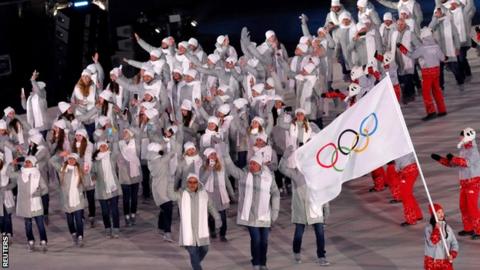
Russia's Olympic ban will be lifted if there are no further doping violations from their athletes at Pyeongchang 2018, the International Olympic Committee has voted unanimously.
However, the IOC says Russian athletes will not be allowed to parade under their own flag at the closing ceremony.
Russia was banned because of state-sponsored doping at Sochi 2014.
A team of 168 competed in South Korea as neutral Olympic athletes from Russia (OAR) but two failed drugs tests.
- Whistleblower's warning over flying Russian flag
- Second Russian athlete banned for doping
- Live coverage of the final day in Pyeongchang
Alexander Krushelnitsky won bronze in the mixed curling but was stripped of his medal after being found guilty of doping while Nadezhda Sergeeva, who competed in bobsleigh, was banned on Saturday.
IOC president Thomas Bach said the failed tests were "very disappointing and prevented the IOC from considering lifting the ban for the closing ceremony".
But referring to the two positive tests, he added: "There is no evidence of systemic doping and no evidence of the involvement of the Russian Olympic Committee in these cases."
The decisions on Russia's ban and the closing ceremony were made at the 132nd IOC session in Pyeongchang where the 52 members present backed recommendations from the IOC's executive board.
The session heard from Nicole Hoevertsz, the head of an implementation group which reported to the IOC on the OAR delegation's "exemplary" behaviour in Pyeongchang.
"We have to draw a line and look towards the future," Hoevertsz said.
"We need to bring this story to an end and look forward. It is never going to be business as usual in sport again or in Russia."
When the IOC announced Russia's ban in December, Bach said the hosts' doping at the Sochi 2014 Games "was an unprecedented attack on the integrity of the Olympic Games and sport".
Only athletes who proved they were clean were able to compete in Pyeongchang for OAR, whose team was the third largest at the Games and has won 16 medals, including one gold.
Why was Russia's Olympic Committee banned?
This entire investigation was instigated by whistleblowing doctor Grigory Rodchenkov, who was director of Russia's anti-doping laboratory during Sochi 2014.
He alleged the country ran a systematic programme of doping and claimed he had created substances to enhance athletes' performances and switched urine samples to avoid detection.
The World Anti Doping Agency (Wada) enlisted the services of Canadian law professor and sports lawyer Dr Richard McLaren to look into the allegations.
The McLaren report concluded 1,000 athletes across 30 sports benefitted from the doping programme between 2012 and 2015.
Wada obtained what it said was a Russian laboratory database which it felt corroborated McLaren's conclusions, while re-testing of Russian athletes' samples resulted in a host of retrospective bans and stripping of medals.
Last week Rodchenkov told BBC Sport that the IOC faced "the most important moment in its history" over whether to allow Russian athletes to parade with their national flag at Sunday's closing ceremony.
Letting them do so would be the IOC's "worst decision", he said.
Reacting to the IOC's decisions on Russia, Rodchenkov's lawyer, Jim Walden, said in a statement: "Thomas Bach was a drowning man, but finally cooler heads within the IOC threw him a life preserver.
"Yet, in the decision, the IOC had the gall to claim Russia 'respected' its decision on 5 December to institute the suspension. This, despite Russia's continued retaliation against the IOC's main witness, Dr Rodchenkov, and Russia's litany of further transgressions, including denial and obstruction toward the IOC and World Anti-Doping Agency. The acrimony caused by Bach's mismanagement should be his undoing."
No comments:
Post a Comment